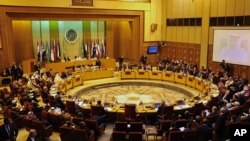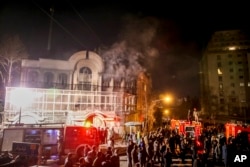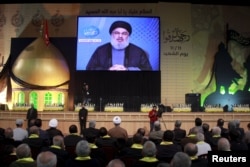As Saudi Arabia-led recriminations against Lebanon continue, the country's overseas workers and business leaders are holding their collective breath.
Beirut airport is set to receive the latest in a series of unwelcome arrivals, as another group of Lebanese workers was expelled from the Gulf because of alleged links to Hezbollah. It's the latest of a flurry of hostile moves by Saudi-affiliated countries as relations with Lebanon turn bitter.
In Lebanon, concerns are rising that political sanctions are bleeding into business ones — a dangerous prospect in a country where Gulf ties provide a crucial shot in the arm for an economy beset by challenges.
"This could create a catastrophe," warned Elie Rizk, the head of the Saudi Lebanese Business Development Commission.
"Saudi-Lebanese relations go back a long way," he said, "but business ties could be badly impacted."
The punishment being doled out to Lebanon began last month when Saudi Arabia canceled a multi-billion-dollar arms package in reaction to Lebanon's failure to condemn an attack on the Saudi embassy in Tehran.
However, many regional analysts see it as part of a bigger conflict between Riyadh and Tehran, and evidence of growing Saudi anger at the power of Iran-backed Hezbollah in Lebanon.
In the weeks that followed, the Gulf Cooperation Council and the Arab League have labeled Hezbollah a "terrorist group." Gulf governments have imposed travel bans on some Lebanese, in addition to expelling Lebanese workers, and have placed sanctions on a number of companies and individuals accused of being Hezbollah affiliated.
Rizk says the government hasn't done enough to condemn Hezbollah and placate the GCC countries.
"As the private sector, we are taking the initiative and holding meetings in Saudi Arabia and across the GCC to ensure Lebanon is represented properly, and playing the role of a shadow government," he said.
"But we're not the government."
Strong ties
There are strong economic motivations to repair ties.
Political deadlock and instability, accentuated by the Syrian war, have led to barely perceptible growth in Lebanon.
"The GCC has always been a lifeline for the Lebanese economy," explained Nassib Ghobril, an analyst with Lebanese Byblos Bank. He says the current situation is unprecedented.
Because of declines in other markets and industries, Ghobril says trade with the GCC nations has become even more important.
At a time when other investors are steering clear, the Gulf has provided some economic stability.
Ghobril estimates that three-quarters of foreign investment in Lebanon over the past three years came from Saudi Arabia, Kuwait and the United Arab Emirates, while the region also plays an important role in the country's tourism sector.
The Gulf also is the main market for many Lebanese exporters.
In Beirut, Mark Acar owns Black Box, an energy industry company with offices in Lebanon and Saudi Arabia. "We try not to worry too much unless something certain does happen, but clearly there's a possibility that we could see a bleed through," he told VOA.
"People are watching, it's just that they can't really do anything."
Worker fears
This sense of helplessness extends to the thousands of Lebanese working in the Gulf and their families at home.
For decades, remittances from Lebanese workers overseas have played a vital role in keeping the deeply indebted country afloat.
"There's a lot of nervousness at the moment [among Lebanese migrant workers], there's no doubt about it," said Akhram Khater, director of the Khayrallah Center for Lebanese Diaspora Studies.
He estimated that there are around 180,000 Lebanese nationals in the Gulf, but some experts place the figure at closer to 500,000.
Khater says that in the largely Sunni GCC countries, the fear would be particularly acute among Lebanon's Shia workers, who may fall under suspicion due to Hezbollah's mainly Shia support base.
He downplayed the likelihood of widespread expulsions.
Repairing the damage
With reports indicating that Thursday's regular League of Arab States meeting in Cairo may bring fresh developments, unpredictability is one thing many commentators agree on.
For now, the markets have proved resilient to the recriminations, Byblos Bank's Ghobril said. But he warned that "there are concerns [about the need] to restore this relationship, to repair what has been damaged."
How the Lebanese government and business community can placate Saudi wrath, however, remains to be seen.
Aurélie Daher, Middle East specialist and author of an upcoming book on Hezbollah, expects to see more expulsions "as just another way to put pressure on the Lebanese government for them to take firm moves against Hezbollah."
But Daher warns that government efforts to minimize the power of Hezbollah — which has a major role and support base in Lebanon — carry risks far greater than a damaged economy.
"Change is not achievable," she said, "unless the Beirut government is ready to put the Lebanese politician scene as well as society on fire."






